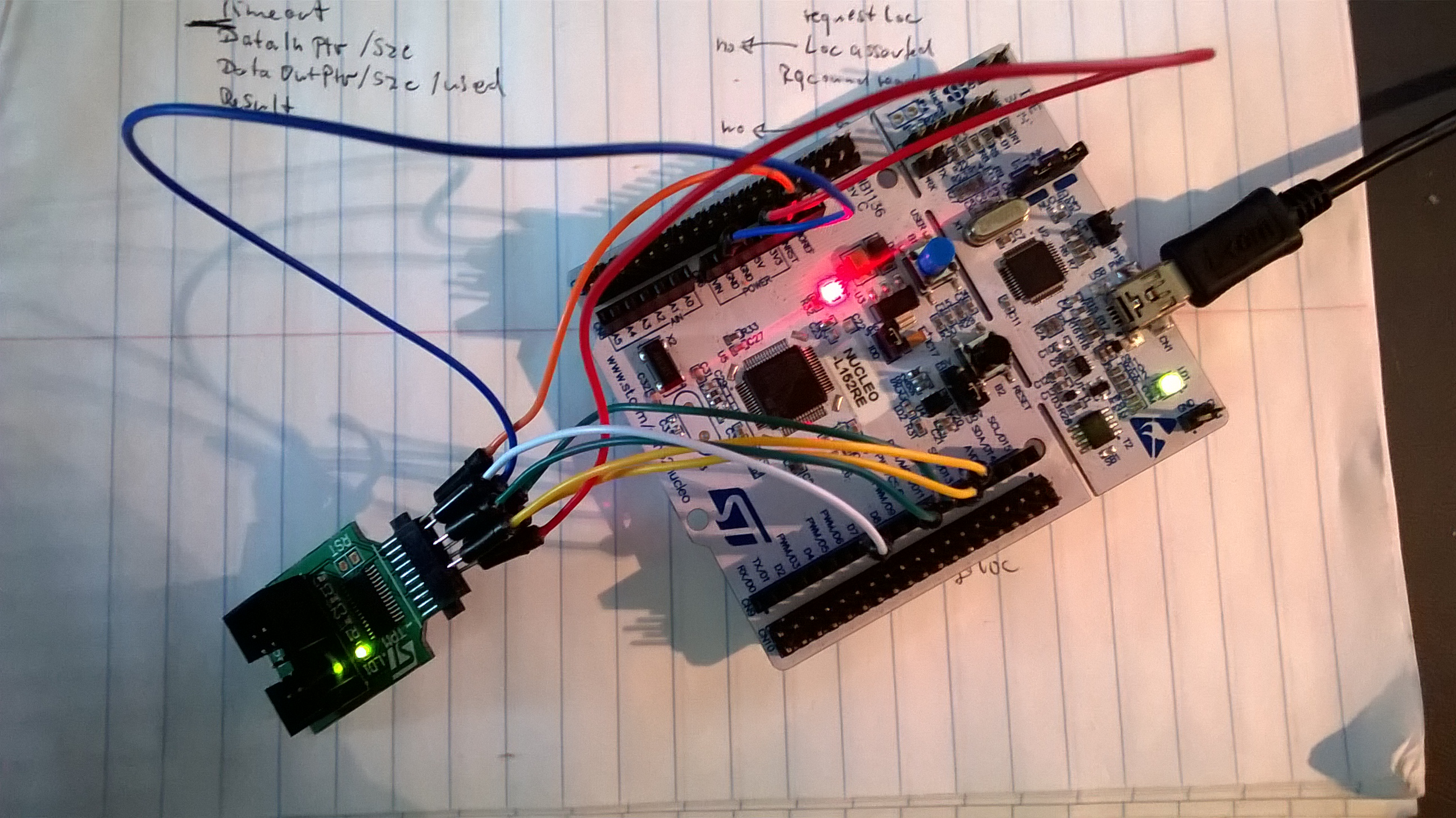TCG TIS 1.3 compliant TPM driver to use the TPM as hardware crypto library.
 The TPM 2.0 architecture, commands and structures are defined in the set of 4 Trusted Platform Module Library Specification, Family "2.0" specifications that that can be found at http://www.trustedcomputinggroup.org/resources/tpm_library_specification
The TPM 2.0 architecture, commands and structures are defined in the set of 4 Trusted Platform Module Library Specification, Family "2.0" specifications that that can be found at http://www.trustedcomputinggroup.org/resources/tpm_library_specification
The "PC Client Specific TPM Interface Specification (TIS), Version 1.3" that was used for this implementation can be found at http://www.trustedcomputinggroup.org/resources/pc_client_work_group_pc_client_specific_tpm_interface_specification_tis
All the information to get going is in SPITIS_TPM20.h!
GizmosNGadgets.h
- Committer:
- LordOfDorks
- Date:
- 2015-04-11
- Revision:
- 3:4b9ad18eae02
- Parent:
- 1:fd0a59e55a85
File content as of revision 3:4b9ad18eae02:
/* mbed TCG SPI TPM 2.0 TIS 1.3 driver,
* Copyright (c) 2015, Microsoft Coprporation Inc.
* by Stefan Thom (LordOfDorks) StefanTh@Microsoft.com, Stefan@ThomsR.Us
*
* Permission is hereby granted, free of charge, to any person obtaining a copy
* of this software and associated documentation files (the "Software"), to deal
* in the Software without restriction, including without limitation the rights
* to use, copy, modify, merge, publish, distribute, sublicense, and/or sell
* copies of the Software, and to permit persons to whom the Software is
* furnished to do so, subject to the following conditions:
*
* The above copyright notice and this permission notice shall be included in
* all copies or substantial portions of the Software.
*
* THE SOFTWARE IS PROVIDED "AS IS", WITHOUT WARRANTY OF ANY KIND, EXPRESS OR
* IMPLIED, INCLUDING BUT NOT LIMITED TO THE WARRANTIES OF MERCHANTABILITY,
* FITNESS FOR A PARTICULAR PURPOSE AND NONINFRINGEMENT. IN NO EVENT SHALL THE
* AUTHORS OR COPYRIGHT HOLDERS BE LIABLE FOR ANY CLAIM, DAMAGES OR OTHER
* LIABILITY, WHETHER IN AN ACTION OF CONTRACT, TORT OR OTHERWISE, ARISING FROM,
* OUT OF OR IN CONNECTION WITH THE SOFTWARE OR THE USE OR OTHER DEALINGS IN
* THE SOFTWARE.
*
*/
#ifndef min
#define min(a,b) (((a) < (b)) ? (a) : (b))
#endif
#ifndef max
#define max(a,b) (((a) > (b)) ? (a) : (b))
#endif
#define ALL_FLAGS_SET(__value, __flags) \
((__value & __flags) == __flags) \
#define TIS_BASE_ADDRESS (0x00d40000)
#define TIS_HEADER(__LOCALITY, __READCYCLE, __REGISTER, __PAYLOAD)\
(TIS_BASE_ADDRESS | \
(__READCYCLE ? 0x80000000 : 0x00000000) | \
((__PAYLOAD - 1) << 24) | \
(__LOCALITY << 12) | \
(__REGISTER))
// Empty Assert
#define pAssert(a)
// Aggregate bytes into an UINT
#define BYTE_ARRAY_TO_UINT8(b) (UINT8)((b)[0])
#define BYTE_ARRAY_TO_UINT16(b) (UINT16)( ((b)[0] << 8) \
+ (b)[1])
#define BYTE_ARRAY_TO_UINT32(b) (UINT32)( ((b)[0] << 24) \
+ ((b)[1] << 16) \
+ ((b)[2] << 8 ) \
+ (b)[3])
#define BYTE_ARRAY_TO_UINT64(b) (UINT64)( ((UINT64)(b)[0] << 56) \
+ ((UINT64)(b)[1] << 48) \
+ ((UINT64)(b)[2] << 40) \
+ ((UINT64)(b)[3] << 32) \
+ ((UINT64)(b)[4] << 24) \
+ ((UINT64)(b)[5] << 16) \
+ ((UINT64)(b)[6] << 8) \
+ (UINT64)(b)[7])
#define BYTE_ARRAY_TO_LEUINT16(b) (UINT16)( ((b)[1] << 8) \
+ (b)[0])
#define BYTE_ARRAY_TO_LEUINT32(b) (UINT32)( ((b)[3] << 24) \
+ ((b)[2] << 16) \
+ ((b)[1] << 8 ) \
+ (b)[0])
#define BYTE_ARRAY_TO_LEUINT64(b) (UINT64)( ((UINT64)(b)[7] << 56) \
+ ((UINT64)(b)[6] << 48) \
+ ((UINT64)(b)[5] << 40) \
+ ((UINT64)(b)[4] << 32) \
+ ((UINT64)(b)[3] << 24) \
+ ((UINT64)(b)[2] << 16) \
+ ((UINT64)(b)[1] << 8) \
+ (UINT64)(b)[0])
// Disaggregate a UINT into a byte array
#define UINT8_TO_BYTE_ARRAY(i, b) ((b)[0] = (BYTE)(i), i)
#define UINT16_TO_BYTE_ARRAY(i, b) ((b)[0] = (BYTE)((i) >> 8), \
(b)[1] = (BYTE) (i), \
(i))
#define UINT32_TO_BYTE_ARRAY(i, b) ((b)[0] = (BYTE)((i) >> 24), \
(b)[1] = (BYTE)((i) >> 16), \
(b)[2] = (BYTE)((i) >> 8), \
(b)[3] = (BYTE) (i), \
(i))
#define UINT64_TO_BYTE_ARRAY(i, b) ((b)[0] = (BYTE)((i) >> 56), \
(b)[1] = (BYTE)((i) >> 48), \
(b)[2] = (BYTE)((i) >> 40), \
(b)[3] = (BYTE)((i) >> 32), \
(b)[4] = (BYTE)((i) >> 24), \
(b)[5] = (BYTE)((i) >> 16), \
(b)[6] = (BYTE)((i) >> 8), \
(b)[7] = (BYTE) (i), \
(i))
#define LEUINT16_TO_BYTE_ARRAY(i, b) ((b)[1] = (BYTE)((i) >> 8), \
(b)[0] = (BYTE) (i), \
(i))
#define LEUINT32_TO_BYTE_ARRAY(i, b) ((b)[3] = (BYTE)((i) >> 24), \
(b)[2] = (BYTE)((i) >> 16), \
(b)[1] = (BYTE)((i) >> 8), \
(b)[0] = (BYTE) (i), \
(i))
#define LEUINT64_TO_BYTE_ARRAY(i, b) ((b)[7] = (BYTE)((i) >> 56), \
(b)[6] = (BYTE)((i) >> 48), \
(b)[5] = (BYTE)((i) >> 40), \
(b)[4] = (BYTE)((i) >> 32), \
(b)[3] = (BYTE)((i) >> 24), \
(b)[2] = (BYTE)((i) >> 16), \
(b)[1] = (BYTE)((i) >> 8), \
(b)[0] = (BYTE) (i), \
(i))